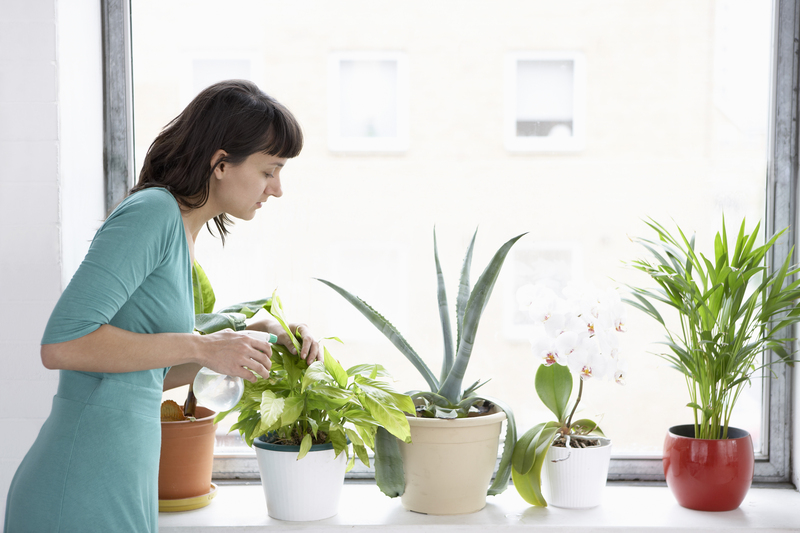Cultivate Positivity: Gardening's Role in Climate Change
Posted on 16/09/2025
Cultivate Positivity: Gardening's Role in Climate Change
Did you know that every patch of green space, from your backyard to city rooftops, can make a real difference in our planet's future? As climate change accelerates, more people are asking: How can we be part of the solution? One simple yet powerful answer lies right under our fingertips -- cultivating gardens.
Gardening: An Unexpected Force Against Climate Change
The phrase gardening and climate change might not conjure up scenes of giant wind turbines or sprawling solar farms, but the humble garden has untapped climate-fighting potential. When managed with intention and sustainable practices, gardens of all sizes help to:
- Reduce harmful greenhouse gas emissions
- Capture carbon from the air (carbon sequestration)
- Foster biodiversity and resilience in local ecosystems
- Buffer weather extremes and improve local climate
Let's dig deeper into why gardening is becoming a vital tool in climate resilience and discover actionable ways you can cultivate positivity for the Earth -- right at home.

Nature's Work: How Gardens Fight Back Against Climate Change
1. Carbon Sequestration: Soil as a Climate Solution
Soil isn't just dirt -- it's one of the planet's largest carbon sinks. Through photosynthesis, plants absorb carbon dioxide and store it in their tissues and roots. When you cultivate a garden, you are enlisting:
- Trees, shrubs, and perennials that lock away carbon for years or decades
- Healthy soils enhanced by compost and mulch, increasing soil organic matter and carbon storage
- Microorganisms and fungi that cycle nutrients and reinforce soil health
Tip: Minimize soil disturbance by practicing no-dig or low-till gardening. This preserves soil structure, reduces carbon loss, and supports beneficial life below the surface.
2. Reducing Emissions Through Sustainable Gardening
Traditional gardening can unfortunately contribute to emissions through synthetic fertilizers, pesticides, and gas-powered equipment. To make your garden climate-positive:
- Compost organic waste instead of chemically fertilizing
- Utilize hand tools or electric alternatives rather than fuel-powered machinery
- Choose native and drought-resistant plants to limit water use and eliminate the need for chemical support
- Practice crop rotation and interplanting to lessen pest outbreaks naturally
Every small climate-friendly choice in your garden adds up to significant environmental benefit over time.
3. Gardening Promotes Biodiversity and Ecosystem Health
Diverse gardens are resilient gardens. Monoculture lawns and landscapes do little for the environment, but gardens filled with native species -- flowers, shrubs, trees, and groundcovers -- provide critical food and shelter for birds, pollinators, and beneficial insects.
- Plant a variety of species to encourage a resilient ecosystem
- Create layers (canopy, understory, groundcover) to support different wildlife
- Install wildlife-friendly features: birdhouses, bee hotels, water sources
By supporting biodiversity, climate positive gardening boosts nature's ability to adapt and recover from climate change impacts.
Sustainable Gardening Techniques for a Changing Climate
Climate change is shifting how we garden. Rising temperatures, unpredictable rainfall, and extreme weather mean adopting innovative, adaptable gardening strategies is more valuable than ever. Here are expert-recommended methods to future-proof your green space:
1. Water-Wise and Drought-Tolerant Plants
With erratic rainfall and periodic droughts now commonplace, water management in the garden is critical. Try these approaches:
- Choose native plants that naturally thrive in your climate with minimal irrigation
- Use mulch to retain soil moisture and reduce evaporation
- Collect and deploy rainwater with barrels and swales
- Plant deeply and space correctly to foster robust root growth
2. Composting: Turning Waste Into Climate Action
Landfilled food scraps create methane, a potent greenhouse gas. Composting at home transforms this waste into nutrient-rich soil amendment, naturally reducing emissions and supporting carbon capture.
- Compost kitchen scraps, coffee grounds, and garden trimmings
- Spread finished compost on garden beds to build healthy, carbon-rich soil
3. Permaculture Principles and Forest Gardens
Permaculture is a style of climate positive gardening rooted in observation and working with nature rather than against it. Forest gardens mimic the diversity of woodland ecosystems while providing food, medicine, and habitat.
- Stack plantings in vertical layers
- Use companion planting to maximize growth and reduce pests
- Avoid bare soil - use cover crops and living mulches to protect and enrich it
4. Urban Gardening: Green Oases for City Climates
Urban areas are especially vulnerable to the impacts of a warming world. Rooftop gardens, green walls, and community plots are transforming cityscapes, offering benefits such as:
- Cooling buildings and reducing the urban heat island effect
- Filtering pollution and improving air quality
- Producing local food with a low carbon footprint
- Creating habitats for pollinators amid concrete jungles
The Psychological and Community Benefits of Climate-Positive Gardening
Gardening does more than just help the environment. Scientific studies show it also supports mental, emotional, and social well-being -- key ingredients for broader climate action.
- Nature connection reduces stress and fosters eco-conscious values
- Community gardens build relationships and climate resilience
- Growing your own food promotes sustainability literacy and healthy eating
- Gardens empower people to take daily climate action
By cultivating gardens, we strengthen individual and collective capacity to face the climate crisis with hope, creativity, and unity.
Case Studies: Gardening for Climate Action in Action
Community Gardens as Carbon Sinks
In cities like New York and London, community gardening programs have transformed vacant lots into pockets of lush biodiversity. These urban oases sequester carbon, absorb stormwater, and provide vital habitat for insects and birds -- while supplying fresh produce to residents.
Permaculture Sites: Edible Landscapes With Lasting Impact
Across the globe, permaculture educators are turning degraded land into regenerative edible landscapes. By prioritizing perennial crops, minimal disturbance, and closed-loop fertilization, these projects lock away tons of carbon while offering food security and livelihoods to local communities.
Common Challenges and Practical Solutions
Even the most motivated gardeners face obstacles, ranging from pests and disease to limited space or time. To keep your climate positive gardening journey thriving:
- Embrace trial and error - learning from nature is part of the process
- Start small: a windowsill, patio, or one backyard bed can make a difference
- Welcome helpful wildlife (ladybugs, bees, birds) for natural pest control
- Join local gardening groups for community support and inspiration

How to Get Started with Climate Positive Gardening
Ready to transform your green space into a climate hero? Follow these steps to get started:
- Assess Your Site: Observe sun, shade, soil, wind patterns
- Choose climate-resilient, native species for your area
- Create a compost pile and use organic matter to enrich your beds
- Embrace mulching, companion planting, and natural pest management
- Connect with local gardening networks and community initiatives
Remember, every seed sown with climate care is a statement of hope and positivity for the planet.
Conclusion: Every Gardener Counts in the Fight Against Climate Change
Climate change can feel overwhelming -- but together, every garden, balcony, and window box matters. From carbon sequestration and habitat creation to drought adaptation and mental well-being, the act of gardening is powerful, positive climate action.
As you nurture your green space, you're nurturing the future of the planet. Become a climate hero in your community by cultivating positivity through gardening -- and inspire others to join you.
Further Reading & Resources:
- Royal Horticultural Society: Climate Change Gardening
- Grow for Climate
- US EPA: Urban Heat Islands & Vegetation
- Permaculture Principles
Start today. Cultivate positivity. Let your garden be a powerful solution in our changing climate.
Latest Posts
Sleek and Stylish: Hedge Trimming Techniques Reimagined
Gardening Hacks: Keep Your Plants Thriving in Winter
Cultivate Positivity: Gardening's Role in Climate Change
Set your garden up for success with these 9 essential beginner tips

